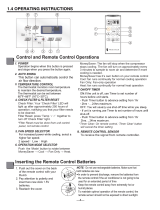Friedrich CP08E10 is a specialized cooling-only device, delivering up to 6,000 BTU per hour. Provided with a washable filter, this air conditioner will take care of dust and other particles in your room. For flexible installation, it features a compact size and a convenient slide-in/out chassis. Moreover, its top-down design and adjustable thermostat will help you simplify the process of installation and further usage.
Friedrich CP08E10 is a specialized cooling-only device, delivering up to 6,000 BTU per hour. Provided with a washable filter, this air conditioner will take care of dust and other particles in your room. For flexible installation, it features a compact size and a convenient slide-in/out chassis. Moreover, its top-down design and adjustable thermostat will help you simplify the process of installation and further usage.



















-
 1
1
-
 2
2
-
 3
3
-
 4
4
-
 5
5
-
 6
6
-
 7
7
-
 8
8
-
 9
9
-
 10
10
-
 11
11
-
 12
12
-
 13
13
-
 14
14
-
 15
15
-
 16
16
-
 17
17
-
 18
18
-
 19
19
-
 20
20
-
 21
21
-
 22
22
-
 23
23
-
 24
24
-
 25
25
-
 26
26
-
 27
27
-
 28
28
-
 29
29
-
 30
30
Friedrich CP08E10 User manual
- Type
- User manual
- This manual is also suitable for
Friedrich CP08E10 is a specialized cooling-only device, delivering up to 6,000 BTU per hour. Provided with a washable filter, this air conditioner will take care of dust and other particles in your room. For flexible installation, it features a compact size and a convenient slide-in/out chassis. Moreover, its top-down design and adjustable thermostat will help you simplify the process of installation and further usage.
Ask a question and I''ll find the answer in the document
Finding information in a document is now easier with AI
Related papers
-
Friedrich UE08, UE10, UE12 User manual
-
Friedrich CP12A10 User manual
-
Friedrich US10C10 User manual
-
Friedrich UE10C33 User manual
-
Friedrich US10C10 User manual
-
Friedrich CP12F10 User manual
-
Friedrich CP10E10 User manual
-
Friedrich CP06E10 User manual
-
Friedrich CP08F10 User manual
-
Friedrich ZQ10 User manual
Other documents
-
Triarch 29239 User manual
-
 Friedrich Air Conditioning EP12G33 User guide
Friedrich Air Conditioning EP12G33 User guide
-
LG LWHD8000RY6 Owner's manual
-
Hampton Bay M8004R User manual
-
DeLonghi Pinguino C100 Specification
-
Heat Controller BD-81 User manual
-
DeLonghi Pinguino C100 Instructions For Use Manual
-
COMFORT-AIRE Comfort-Aire CD-101-5 User manual
-
LG L1006RY6 Owner's manual
-
GE AGE18DA Owner's manual































